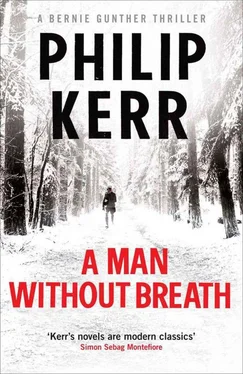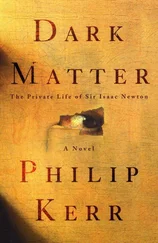Philip Kerr - A Man Without Breath
Здесь есть возможность читать онлайн «Philip Kerr - A Man Without Breath» весь текст электронной книги совершенно бесплатно (целиком полную версию без сокращений). В некоторых случаях можно слушать аудио, скачать через торрент в формате fb2 и присутствует краткое содержание. Год выпуска: 2013, Издательство: Quercus, Жанр: Триллер, на английском языке. Описание произведения, (предисловие) а так же отзывы посетителей доступны на портале библиотеки ЛибКат.
- Название:A Man Without Breath
- Автор:
- Издательство:Quercus
- Жанр:
- Год:2013
- ISBN:нет данных
- Рейтинг книги:4 / 5. Голосов: 1
-
Избранное:Добавить в избранное
- Отзывы:
-
Ваша оценка:
- 80
- 1
- 2
- 3
- 4
- 5
A Man Without Breath: краткое содержание, описание и аннотация
Предлагаем к чтению аннотацию, описание, краткое содержание или предисловие (зависит от того, что написал сам автор книги «A Man Without Breath»). Если вы не нашли необходимую информацию о книге — напишите в комментариях, мы постараемся отыскать её.
A Man Without Breath — читать онлайн бесплатно полную книгу (весь текст) целиком
Ниже представлен текст книги, разбитый по страницам. Система сохранения места последней прочитанной страницы, позволяет с удобством читать онлайн бесплатно книгу «A Man Without Breath», без необходимости каждый раз заново искать на чём Вы остановились. Поставьте закладку, и сможете в любой момент перейти на страницу, на которой закончили чтение.
Интервал:
Закладка:
And then he was gone, leaving me alone with Dobberke.
‘That was a touching reunion.’ By way of explanation I added: ‘Formerly he and I were colleagues at the Police Praesidium.’ I shook my head. ‘I can’t say time or circumstances have mellowed him any.’
‘He’s not such a bad fellow,’ Dobberke said, generously. ‘For a Jew, I mean. But for him this place would never keep going.’
I sat down on the edge of Franz Meyer’s bed and sighed.
‘I don’t see this fellow talking to anyone soon, except Saint Peter,’ I said. ‘I haven’t seen a man with a head injury like that since 1918. It’s like someone took a hammer to a coconut.’
‘That’s quite a lump you have on your own head,’ said Dobberke.
I touched my head, self-consciously. ‘I’m all right.’ I shrugged. ‘Why does it keep going? The hospital?’
‘It’s a garbage can for misfits,’ he said. ‘A collection camp. You see, the Jews here are an odd lot. They’re orphans of uncertain parentage, some collaborators, a few pet Jews who are under the protection of one bigwig or another, several attempted suicides-’
Dobberke caught the look of surprise on my face and shrugged.
‘Yes, suicides,’ he said. ‘Well, you can’t make someone who’s half dead walk on and off a deportation train, can you? That’s just more trouble than it’s worth. So they send those yids here, nurse them back to health and then, when they’re well again, put them on the next train East. That’s what’ll happen to this poor bastard if ever he comes round.’
‘So not everyone in here is actually sick?’
‘Lord, no.’ He lit a cigarette. ‘I expect they’ll close it down soon enough. Word is that Kaltenbrunner has his eye on owning this hospital.’
‘That ought to come in handy. Nice place like this? Make a nice suite of offices.’
Following the death of my old boss, Reinhard Heydrich, Ernst Kaltenbrunner was the new head of the RSHA, but quite what he wanted with his own Jewish hospital was anyone’s guess. His own drying-out clinic, perhaps, but I managed to keep that particular thought to myself. Werner Sachse’s advice to watch my mouth had been wearing red intelligence stripes; after Stalingrad everyone – but more especially Berliners, like me, for whom black humour was a religious calling – was probably well advised to keep a zip on the lip.
‘Will he get it? Kaltenbrunner?’
‘I haven’t the faintest idea.’
Because I wanted to look at anything other than poor Franz Meyer’s badly damaged head, I went to the window, which was when I noticed the flower arrangement on his bedside table.
‘That’s interesting,’ I said, looking at the card next to the vase, which was unsigned.
‘What is?’
‘The daffodils,’ I said. ‘I’ve just come out of hospital and no one sent me any flowers. And yet this fellow has fresh flowers, and from Theodor Hubner’s shop on Prinzenstrasse no less.’
‘So?’
‘In Kreuzberg.’
‘I still don’t-’
‘It used to be florist’s by royal appointment. Still is for all I know. Which means they’re expensive. Very expensive.’ I frowned. ‘What I mean to say is, I doubt there are many people in here who get fresh flowers from Hubner’s. In here or anywhere else for that matter.’
Dobberke shrugged. ‘His family must have sent them. The Jews still have plenty of money hidden under their mattresses. Everyone knows that. I was out East, in Riga, and you should have seen what these bastards had in their underwear. Gold, silver, diamonds, you name it.’
I smiled patiently, avoiding the obvious question of exactly how it was that Dobberke came to be looking for valuables in someone else’s underwear.
‘Meyer’s family were Germans,’ I said. ‘And besides, they’re all dead. Killed by the same bomb that gave him the centre parting in his hair. No, it must have been someone else who sent these flowers. Someone German, someone with money and taste. Someone who only has the best.’
‘Well, he’s not saying who they’re from,’ observed Dobberke.
‘No,’ I said. ‘He’s not saying anything, is he? Doctor Lustig was right about that, at least.’
‘I could look into it if you thought it was important. Perhaps one of the nurses could tell you who sent them.’
‘No,’ I said firmly. ‘Forget about it. It’s an old habit of mine, being a detective. Some people collect stamps, others like postcards or autographs; me I collect trivial questions. Why this, why that? Of course any fool can start a collection like that, and it goes without saying that it’s the answers to the questions that are really valuable, because the answers are a lot harder to track down.’
I took another long hard look at Franz Meyer and realized it could just as easily have been me lying in that bed with half a head, and for the first time in a long time I suppose I felt lucky. I don’t know what else you call it when an RAF bomb kills four, maims one, and leaves you with nothing more than a bump on the head. But just the idea of me being lucky again made me smile. Perhaps I’d turned some sort of a corner in my life. It was that and maybe also the apparent success of the women’s protest in Rosenstrasse and the other good luck I’d had not to have been part of the Sixth Army in Stalingrad.
‘What’s amusing?’ asked Dobberke.
I shook my head. ‘I was just thinking that the important thing in life – the really important thing after all is said and done – is just to stay alive.’
‘Is that one of the answers?’ asked Dobberke.
I nodded. ‘I think perhaps it’s the most important answer of all, wouldn’t you say?’
CHAPTER 4
Monday, March 8th 1943
It was a twelve-minute walk to work, depending on the weather. When it was cold, the streets froze hard and you had to walk slowly or risk a broken arm. When it thawed, you only had to beware of falling icicles. By the end of March it was still very cold at night but getting warmer during the day, and at last I felt able to remove the layers of newspaper that had helped to insulate the inside of my boots against a freezing Berlin winter. That made walking easier, too.
The Wehrmacht High Command (OKW) was housed in perhaps the largest office complex in Berlin: a five-storey building of grey granite on the north side of the Landwehr Canal, it occupied the whole corner of Bendlerstrasse and Tirpitzufer. Formerly the headquarters of the Imperial German Navy, it was better known as the Bendlerblock. The Bureau’s offices, at Blumeshof 17, looked onto the back of this building and a rose garden that, in summer, filled the air with such a strong smell of roses some of us who worked there called it the flower house. In my office under the eaves of the high red saddle roof, I had a desk, a filing cabinet, a rug on the wooden floor, and an armchair – I even had a painting and a little piece of bronze from the government’s own collection of art. I did not have a portrait of the leader. Few people who worked at the OKW did.
Usually I got to work early and stayed late, but this had very little to do with loyalty or professional zeal. The heating system in the flower house was so efficient that the cold windowpanes were always covered in condensation, so that you had to wipe them before you could look outside. There were even uniformed orderlies who went around building up the coal fires in the individual offices; which was just as well, as these were enormous. All of this meant that life was much more comfortable at the office than it was at home – especially when one considered the generosity of the OKW’s canteen, which was always open. Mostly the food was just stodge – potatoes, pasta and bread – but there was plenty of it. There was even soap and toilet paper in the washrooms, and newspapers in the mess.
Читать дальшеИнтервал:
Закладка:
Похожие книги на «A Man Without Breath»
Представляем Вашему вниманию похожие книги на «A Man Without Breath» списком для выбора. Мы отобрали схожую по названию и смыслу литературу в надежде предоставить читателям больше вариантов отыскать новые, интересные, ещё непрочитанные произведения.
Обсуждение, отзывы о книге «A Man Without Breath» и просто собственные мнения читателей. Оставьте ваши комментарии, напишите, что Вы думаете о произведении, его смысле или главных героях. Укажите что конкретно понравилось, а что нет, и почему Вы так считаете.












